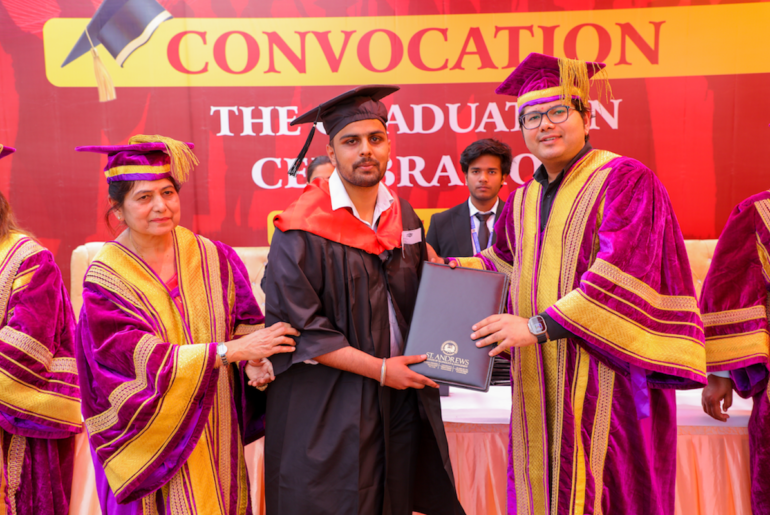MBA in HR
An MBA in HR (Human Resources) is a graduate-level degree designed to equip students with in-depth knowledge and skills in managing and developing a workforce in various types of organizations.

Image – 1 Best Engineering College Award
With an MBA in HR, they specialize in pivotal domains like talent management, organizational behaviour, employment laws, compensation and benefits, labor relations, and strategic HR management.
Here are some key components of an MBA in HR:
MBA HR Curriculum
The curriculum generally includes core business courses such as finance, marketing, and operations, combined with specialized HR courses. These specialized courses might cover areas like recruitment, training and development, compensation and benefits, and labor relations within an MBA program.
Career Opportunities

Image – 2 Convocation Ceremony
Graduates with an MBA in HR can pursue various roles such as HR Manager, Talent Acquisition Specialist, Training and Development Manager, Compensation and Benefits Manager, and HR Consultant. Individuals who pursue MBA may find themselves in roles that involve overseeing various functions such as hiring, training, performance management, and ensuring compliance with employment laws.
Skills Developed
The MBA in HR program not only broadens your understanding of technical HR principles but also cultivates essential soft skills like leadership, communication, strategic thinking, and ethical decision-making.
Networking

Image – 3 Seminar on New Business Ideas
Being in an MBA degree offers significant opportunities to network with professionals in the field, which can be beneficial for career growth and job opportunities.
Global Perspective
Many MBA degrees emphasize a global perspective on business and HR practices, preparing graduates to work in diverse and multinational environments.
Some of the most opted courses in India and St. Andrews college or different Engineering college or Management colleges are as follows:-
- Btech
- Btech CSE
- Btech ETCE
- MTech
- BCA
- BBA
- MBA
- MCA
- DPharma – St. Andrews College of Pharmacy
- BPharma – St. Andrews College of Pharmacy
- BArch – St. Andrews College of Architecture
MBA in HR Eligibility Criteria

Image – 4 SAITM Courses Overview
To pursue an MBA in HR (Human Resources) in India, applicants typically need to meet certain eligibility criteria.
These criteria can vary slightly depending on the institution but generally include the following:
Educational Qualifications
Applicants must hold a bachelor’s degree in any discipline from a recognized university. The minimum percentage required in the undergraduate degree can vary by institution, usually around 50% to 60% for general category students and slightly lower for SC/ST/PwD candidates.
MBA Entrance Exams
Admission to MBA programs in India typically hinges on performance in MBA entrance exams. Common exams include:
- CAT (Common Admission Test): The most widely accepted exam for entry into top business schools like the IIMs and many others.
- XAT (Xavier Aptitude Test): Required for Xavier institutes and several other B-schools.
- MAT (Management Aptitude Test) and CMAT (Common Management Admission Test) are also accepted by various institutions.
Work Experience
While not mandatory for all institutions, some business schools prefer or require candidates to have work experience, especially for executive MBA programs. This experience can provide practical insights and understanding of business environments, which can be beneficial during the program.
Group Discussions and Personal Interviews
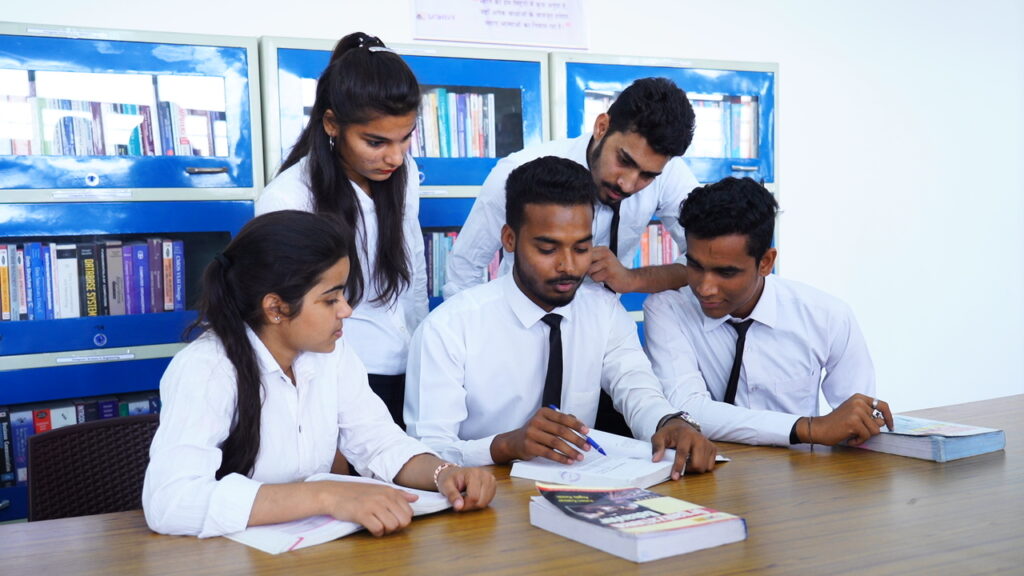
Image – 5 Discussion about the Placement Drive
After qualifying through these exams, candidates may need to participate in group discussions and personal interviews as a part of the selection process. These assess the candidate’s communication skills, leadership qualities, and suitability for a management career in HR.
Additional Requirements
Some institutions might also require essays, statements of purpose, or letters of recommendation as part of the application process.
Admission Process for MBA in HR

Image – 6 SAITM Boys Hostel
The admission process for an MBA in HR (Human Resources) typically involves several steps, designed to evaluate a candidate’s suitability for the program. Here’s a general overview of the process, which is commonly followed in most business schools, especially in competitive markets like India:
Meet Eligibility Criteria
As discussed earlier, candidates need to ensure they meet the basic eligibility requirements, which include having a bachelor’s degree with a certain minimum grade and clearing entrance exams.
MBA Entrance Exams:
Candidates need to appear for entrance tests such as the CAT, XAT, MAT and CMAT. The scores from these exams are crucial for the initial shortlisting for further rounds.
Application Submission
Candidates must fill out an application form for the desired business school. This form may require personal information, educational background, work experience, scores from entrance exams, and sometimes responses to essay questions.
Shortlisting
Based on the entrance exam scores and the details provided in the application, institutions shortlist candidates for the next round, which usually includes group discussions (GD) and personal interviews (PI).
Group Discussion and Personal Interview
The GD round tests a candidate’s ability to contribute to a group, leadership qualities, and real-time problem-solving skills. The PI assesses the candidate’s personality, career objectives, motivation for pursuing an MBA in HR, and overall fit for the program.
Other Assessments
Some institutions may also include a written ability test (WAT) or other forms of assessment to gauge a candidate’s communication skills and analytical thinking.
Final Selection
The final selection is made based on a combination of factors: entrance exam scores, performance in GD/PI/WAT, undergraduate grades, work experience (if applicable), and extracurricular activities. Each component is given a certain weightage in the overall evaluation.
Offer of Admission
Successful candidates receive an offer of admission which they need to accept within a stipulated period. This often involves paying a deposit to secure their seat in the program.
Enrollment
After accepting the offer, candidates will go through an enrollment process which includes submitting final documents, paying tuition fees, and registering for classes.
MBA in HR Fees Structure

Image – 7 Project Exhibition at SAITM
The cost of pursuing an MBA in HR can differ significantly based on factors like the reputation of the institution, its geographical location, and the length of the program.
Here’s a general breakdown of the fees for MBA in HR programs across different types of institutions in India:
Premier Institutes
Institutions like the Indian Institutes of Management (IIMs) are at the top tier in terms of both quality and fees. The fee for an MBA (Master of Business Administration) at these institutions can range from approximately INR 15 lakhs to INR 28 lakhs for the entire program, which covers two years.
Private Colleges and Universities

Image – 8 SAITM Campus
Many reputable private institutions offer MBA in HR programs. The fees at these schools can range from INR 10 lakhs to INR 20 lakhs for the full program. Some well-known private schools might charge fees that are on the higher end, comparable to the IIMs.
State and Public Universities
Fees at state universities tend to be lower than those at private institutions. An MBA in HR from a state university can cost between INR 2 lakhs to INR 10 lakhs for the entire duration of the program.
Distance Learning and Online Programs
For those considering distance or online MBA courses, the fees can be significantly lower, ranging from INR 50,000 to INR 5 lakhs, depending on the institution’s credibility and the structure of the program.
Other Costs
Apart from tuition fees, students should also consider additional costs such as accommodation, food, books, and other educational materials, which can significantly add to the overall expense.
MBA in HR Entrance Exams
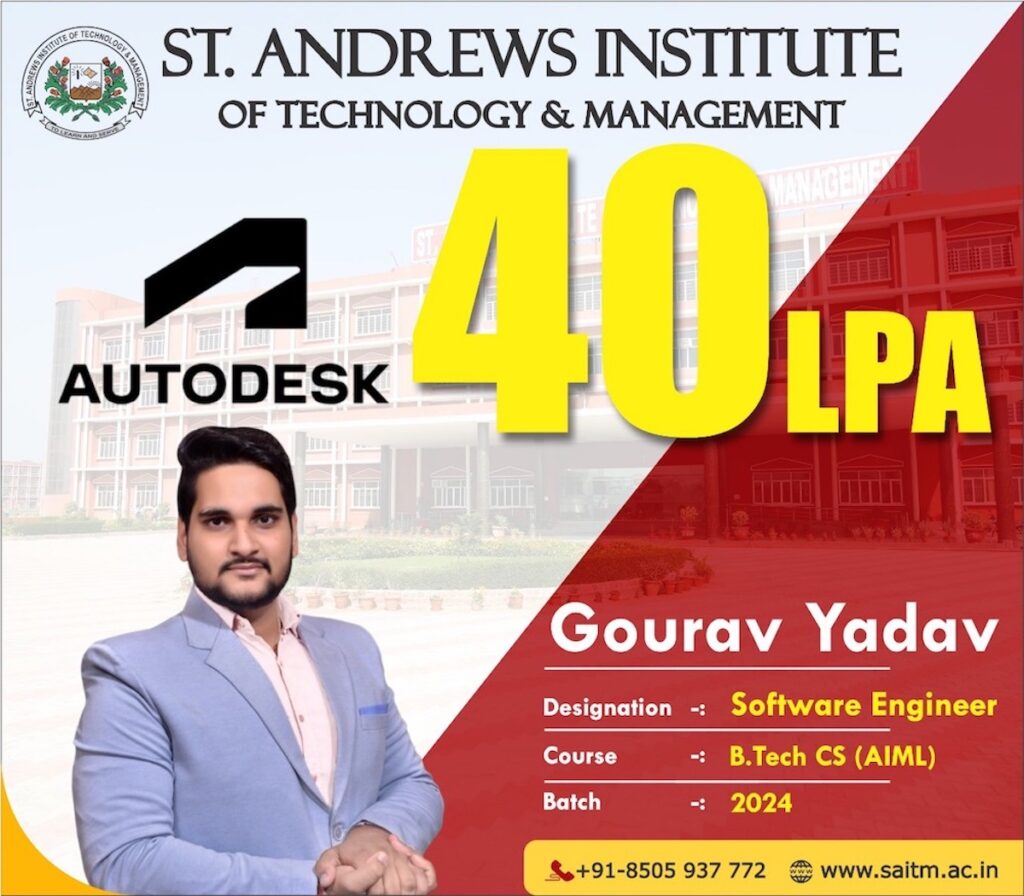
Image – 9 Highest Package
For admission into an MBA in HR (Human Resources) program, especially in competitive markets like India, candidates are typically required to take one or more standardized entrance exams. These exams assess a variety of skills including quantitative ability, verbal ability, logical reasoning, and decision making.
Here are some of the key entrance exams used for MBA admissions in India:
CAT (Common Admission Test)
The most widely accepted exam for MBA admissions, CAT is conducted by the Indian Institutes of Management (IIMs) and is used by a large number of business schools across India. It tests quantitative ability, verbal ability, and logical reasoning.
XAT (Xavier Aptitude Test)
Conducted by XLRI Jamshedpur, XAT is another prominent entrance exam and is accepted by many business schools in India. It includes sections like Decision Making in addition to the usual quantitative, verbal, and logical reasoning sections.
MAT (Management Aptitude Test)
Conducted by the All India Management Association (AIMA), MAT is a standardized test accepted by a large number of business schools for admission into MBA (Master of Business Administration) and allied programs.
CMAT (Common Management Admission Test)
Conducted by the National Testing Agency (NTA), CMAT is a national level entrance examination for entry into management programs in various colleges and universities in India.
Preparation Tips:
Understand the Exam Format: Familiarize yourself with the specific format of the exam you plan to take. This includes understanding the types of questions, the duration of the exam, and the scoring methodology.
Practice Regularly: Consistent practice using mock tests and previous years’ papers can help improve speed and accuracy.
Strengthen Fundamental Skills: Focus on strengthening your quantitative, verbal, and reasoning skills as these are common sections in most entrance exams.
Time Management: Learn to manage your time effectively during the exam to ensure that you are able to attempt all sections adequately.
MBA in HR Semester Wise Syllabus

Image – 10 Inside View of SAITM Campus
A typical MBA in HR (Human Resources) program is structured over four semesters, covering a range of foundational business management courses and specialized HR topics. The semester-wise MBA HR syllabus is designed to build a strong foundation in general management, followed by in-depth HR management skills.
Here is a general overview of the semester-wise syllabus for an MBA in HR:
Semester 1: Foundation in Management
Principles of Management: Introduction to management concepts and business organization.
Organizational Behaviour: Study of human behaviour in organizational settings.
Managerial Economics: Application of economic theory to business management.
Financial Accounting: Basics of financial accounting and reporting.
Quantitative Methods for Management: Statistical and quantitative techniques used in decision-making.
Marketing Management: Fundamentals of marketing principles and strategies.
Business Communication: Enhancing communication skills in a business environment.
Semester 2: Core Business Skills and Introduction to HR
Human Resource Management: Overview of HR functions and their importance in an organization.
Operations Management: Study of production systems and operations efficiency.
Financial Management: Management of finances, including capital budgeting and financial analysis.
Business Research Methods: Techniques for conducting research and analyzing data in business.
Management Information Systems: Use of information technology in managing businesses.
Business Ethics and Corporate Social Responsibility: Ethical considerations and CSR in management.
Semester 3: Advanced HR and Specializations
Strategic Human Resource Management: Linking HR strategies with business strategies.
Performance Management: Designing and implementing performance measurement systems.
Training and Development: Techniques for training and developing employees.
Compensation Management: Theories and practices of employee compensation.
Labor Laws: Understanding applicable labor legislation.
Talent Management: Processes for managing and retaining top talent.
Electives (such as Organizational Development, Employee Relations, HR Analytics, etc.): Offered based on student interests and career goals.
Semester 4: Integration and Application
Change Management: Managing and leading change within organizations.
International HR Management: Managing HR in a global context.
Negotiation and Conflict Management: Skills for managing conflicts and negotiations.
HR Audit and Compliance: Ensuring compliance with HR policies and practices.
Project Work: A comprehensive project that may include internships, live projects, or research projects.
Capstone Course: Typically involves simulation exercises, comprehensive case studies, or a strategic project that integrates various aspects of HR and management.
Additional Learning Opportunities:
Throughout the program, students may also engage in:
Workshops and Guest Lectures: Interactive sessions with industry leaders and HR experts.
Internships: Practical work experience opportunities between the second and third semesters.
Case Studies and Group Discussions: Practical exercises to enhance analytical and decision-making skills.
MBA HR Syllabus in MDU Rohtak
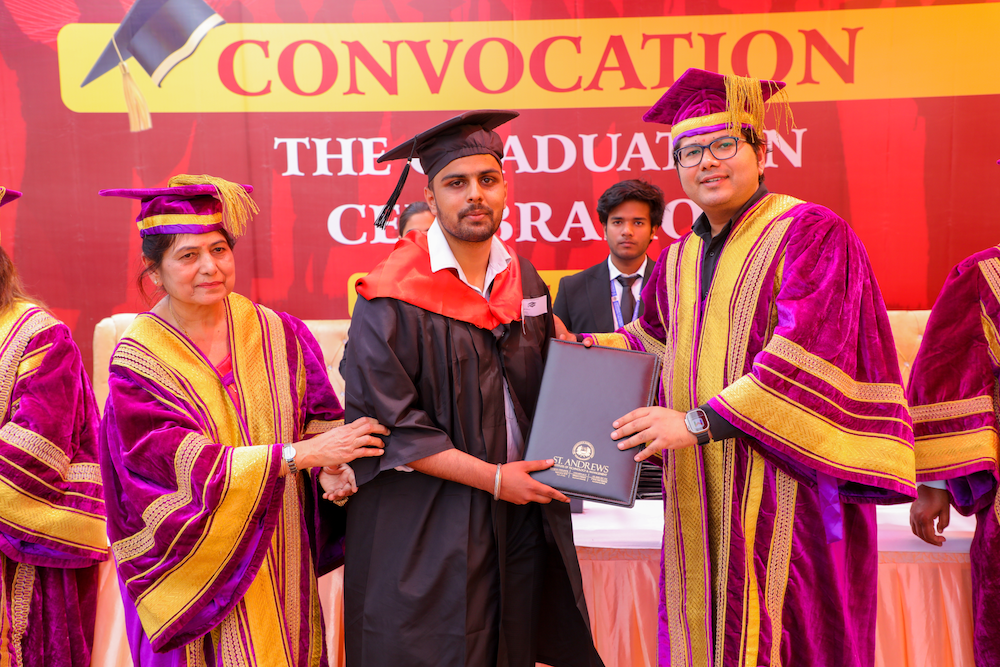
Image – 11 Degree Distribution at SAITM Campus
Maharshi Dayanand University (MDU) in Rohtak offers a diverse MBA degree with a specialization in Human Resources. The syllabus for the MBA in HR at MDU is designed to prepare students with essential knowledge and skills in human resource management along with a strong foundation in general business management.
Here’s an overview of what you might expect in the MBA HR syllabus at MDU Rohtak, structured generally over four semesters:
| Semester I | |
| Management Concepts and Organizational Behavior | Managerial Economics |
| Accounting for Managers | Business Statistics and Analytics |
| Operations Management | Computer Fundamentals and Office Automation Tools |
| Business Environment | |
| Elective Subjects | |
| Business Communication Skills | Event Management |
| Semester II | |
| Financial Management | Business Research Methods |
| Marketing Management | IT Infrastructure Management |
| Human Resource Management | Comprehensive Viva-voce |
| Elective Subjects | |
| Entrepreneurship | Creativity and Innovation Management |
| Semester III | |
| CORE COURSES | |
| Strategic Management | Operations Research |
| Corporate Laws | Summer Training Report |
| Discipline Specific Elective Courses (specialization areas offered under dual specialization scheme) | |
| HUMAN RESOURCE MANAGEMENT | |
| Compensation and Benefits Management | Management of Industrial Relations |
| Organizational Change and Intervention Strategies | Strategic Human Resource Management |
| Human Resource Metrics and Analytics | |
| Semester IV | |
| CORE COURSES | |
| B2B Marketing | Project Report |
| CSR and Business Ethics | Comprehensive Viva-voce 1 |
| Discipline Specific Elective Courses (specialization areas offered under dual specialization scheme) | |
| HUMAN RESOURCE MANAGEMENT | |
| Business Negotiations and Employee Relations | International Human Resource Management |
| Training and Development | Performance
Management Systems |
| Managing
Interpersonal and Group Processes |
Table – 1 MBA HR Syllabus
Types of MBA in HR Courses

Image – 12 Dining Hall at SAITM Campus
The field of Human Resources offers a variety of MBA courses, tailored to different career paths and educational needs. These MBA degrees are designed to equip students with advanced knowledge and skills for managing human capital in organizations.
Here are several types of MBA in HR courses that you might encounter:
1. Full-Time MBA in HR
A traditional full-time MBA in HR is a two-year program that provides a comprehensive education in human resource management along with foundational business management courses. This program is ideal for students who can commit to full-time study and seek a comprehensive immersion in both theoretical knowledge and practical knowledge of business fundamentals and specialized HR topics.
2. Part-Time MBA in HR
Part-time MBA HR courses are designed for working professionals who wish to advance their education without interrupting their careers. These programs usually take longer to complete than full-time programs, often spanning 3 to 4 years, and classes are typically held in the evenings or on weekends.
3. Executive MBA in HR
An Executive MBA (EMBA) in HR is targeted towards professionals with significant managerial or leadership experience seeking advanced expertise in MBA HR. These programs focus more on strategic aspects of HR and leadership development. The courses are usually structured to accommodate the busy schedules of executives, with classes held on weekends or in intensive modules.
4. Online MBA in HR
Online MBA courses offer flexibility and convenience, allowing students to study from anywhere and often at their own pace. These programs are particularly appealing to those who prefer a digital learning environment or who live far from educational institutions offering face-to-face classes.
5. Global or International MBA in HR
Global MBA degrees in HR focus on international human resource management and are designed for students interested in global careers. These MBA HR programs often include opportunities for international residencies or exchanges and teach students how to manage HR issues across different cultures and legal frameworks.
6. Specialized MBA in HR
Some MBA programs offer specializations within the broader field of HR, including options like HR Analytics, Talent Management, or Organizational Development. These are examples of MBA specializations in HR that focus on specific areas of human resources. These specialized MBA HR programs are suitable for students who have a clear idea of their career trajectory and wish to acquire deep expertise in a particular area of HR.
7. Dual Degree MBA in HR
Dual degree programs combine an MBA in HR with another graduate degree, such as a Master of Legal Studies (MLS), Master of Public Administration (MPA), or even a technical field like Information Technology. These MBA HR programs are designed to provide a multidisciplinary approach to business and HR management.
Top Recruiters MBA in HR

Image – 13 Celebration after Placement Drive
MBA graduates with a specialization in HR are highly sought after across various sectors, including large corporations and non-profit organizations. This underscores the crucial role that human resource managers play in guiding and expanding a company’s workforce.
Here are some of the top recruiters that frequently seek MBA HR graduates:
1. Multinational Corporations (MNCs)
Large multinational companies often have extensive HR departments that require skilled professionals to manage their diverse and global workforce. Examples include:
- Microsoft
- Apple
- Amazon
- Samsung
- IBM
2. Consulting Firms
Consulting firms are major employers of MBA HR graduates, particularly those specializing in organizational development, human capital, and strategic HR consulting. Notable consulting firms include:
- Deloitte
- McKinsey & Company
- Boston Consulting Group (BCG)
- Accenture
- PricewaterhouseCoopers (PwC)
- KPMG
3. Financial Institutions
Banks and other financial institutions also recruit MBA HR graduates to help manage and optimize their human resources. Some top financial recruiters are:
- JPMorgan Chase
- Goldman Sachs
- Morgan Stanley
- Citibank
- Wells Fargo
- Bank of America
4. Consumer Goods Companies
FMCG companies require efficient HR management to handle large employee bases, especially in manufacturing, marketing, and sales. Top FMCG recruiters include:
- Procter & Gamble
- Unilever
- Coca-Cola
- Nestlé
- PepsiCo
5. Healthcare and Pharmaceutical Companies
These companies require human resource managers to oversee not only corporate functions but also complex compliance matters related to healthcare. Major recruiters in this sector are:
- Pfizer
- Johnson & Johnson
- Merck
- Gilead Sciences
- Novartis
6. Retail Chains
Retail chains, with their large workforces and high turnover rates, are another major employer of human resource specialists.
- Walmart
- Target
- IKEA
- Home Depot
7. Technology Startups
Emerging tech startups and established technology companies are continually in need of skilled HR professionals to manage rapid growth and change:
- Various rapidly growing startups across global tech hubs.
8. Manufacturing Companies
Large-scale manufacturing firms recruit MBA HR graduates to manage labor relations, safety compliance, and workforce management:
- General Motors
- Ford
- Boeing
- Siemens
9. Telecommunications
Companies in the telecommunications sector also recruit human resource experts to manage their extensive employee bases.
- AT&T
- Verizon
- T-Mobile
10. Government and Public Sector Units
Government agencies and public sector units also hire MBA HR graduates for HR management roles, especially in countries like India:
- Various government departments
- Public sector undertakings (PSUs)
Career Scope after MBA in HR
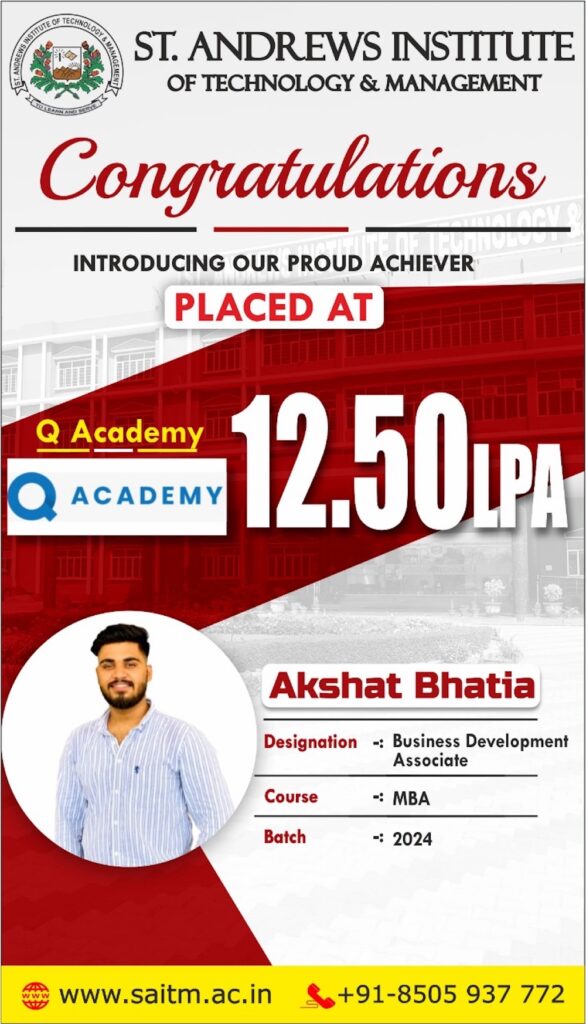
Image – 14 MBA Student Placed as a Business Development Associate at Q ACADEMY
An MBA in Human Resources (HR) equips graduates with a broad range of skills applicable to various industries and organizational types, making them highly sought after in the job market.
Here are some of the key job prospects and roles that MBA HR graduates can pursue:
1. HR Manager
HR Managers oversee all aspects of human resources practices and processes. The role of an HR manager involves developing and implementing HR strategies and initiatives aligned with the overall business strategy, bridging management and employee relations, and managing the recruitment and selection process.
2. Talent Acquisition Specialist
Specializing in recruitment, Talent Acquisition Specialists focus on attracting and hiring top talent. They manage the entire recruitment cycle, develop employer branding, and implement strategies to attract skilled candidates.
3. Compensation and Benefits Manager
These professionals specialize in designing, overseeing, and implementing a company’s compensation and benefits programs. Their work includes ensuring competitive salary rates, health benefits, retirement plans, and other perks to attract and retain employees.
4. Training and Development Manager
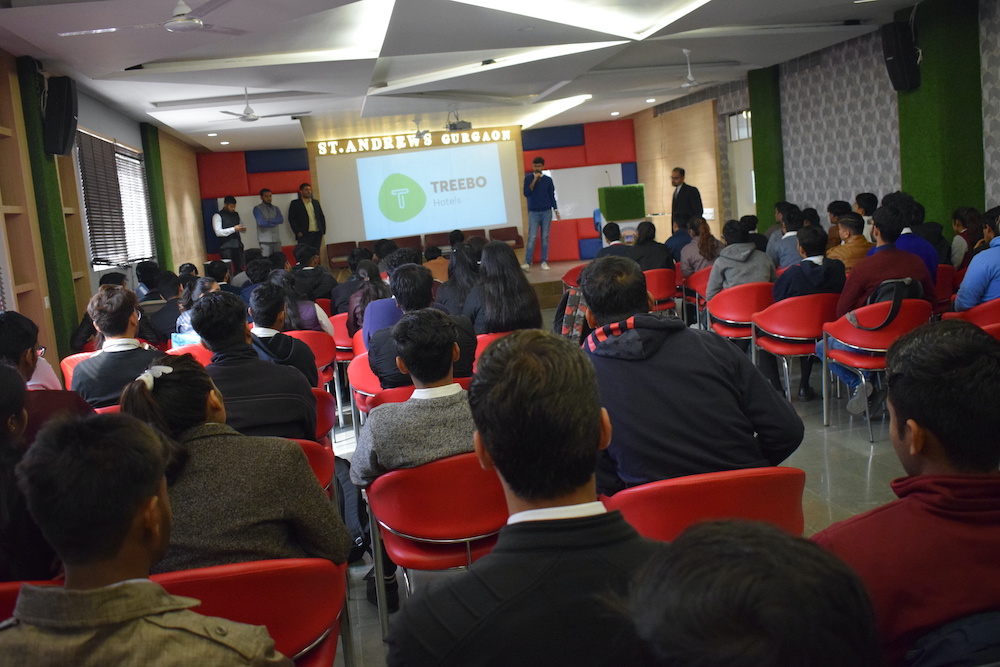
Image – 15 Business Ideas Presented by TREEBO Hotels
Training and Development Managers assess the skills and knowledge within an organization and develop training programs to enhance employees’ growth and performance. This role often involves creating educational materials, workshops, and seminars.
5. Employee Relations Manager
This role focuses on maintaining a positive, ethical, and productive workplace. They address employee grievances, mediate disputes, and work to solve conflicts that may arise between employees and management.
6. HR Consultant
HR Consultants offer advice and expertise to organizations to help them improve their HR operations, implement HR technology, and drive changes in organizational structure. They often work for consulting firms or as independent contractors.
7. Organizational Development Specialist
These specialists focus on improving an organization’s health through planned change in processes and systems. This role is crucial for companies looking to undergo transformations or improve their internal culture.
8. HR Analytics Manager
HR Analytics Managers use data to analyze workforce trends, predict future HR needs, and measure the impact of HR initiatives. This role is increasingly important as companies seek to make data-driven decisions related to their human resources.
9. Chief Human Resources Officer (CHRO)
This senior executive position involves making strategic decisions related to human capital within the company. The CHRO is responsible for setting and executing HR policies and strategies at the highest level.
10. Diversity and Inclusion Manager
Specialists in this area develop policies and programs to create and promote a diverse and inclusive workplace. This role includes training programs, diversity workshops, and ensuring compliance with equal employment opportunity laws.
Industries and Sectors
MBA HR graduates are employed across various industries including:
- Technology
- Healthcare
- Finance and Banking
- Consulting
- Retail and Consumer Goods
- Manufacturing
- Government and Public Sector
MBA in HR Management Reference Books

Image – 16 Sports Day Event at SAITM Campus
An MBA in Human Resources (HR) encompasses a broad range of topics that require comprehensive study. There are several key reference books that can enhance understanding and provide in-depth insights into various aspects of HR management.
Here’s a list of highly recommended books that can be useful for MBA HR students:
1. “Human Resource Management” by Gary Dessler
This book is a staple in many HR courses and offers a thorough overview of all aspects of human resource management, including modern challenges like managing diversity, performance management, and benefits.
2. “Strategic Human Resource Management” by Jeffrey A. Mello
Focusing on strategic aspects of HRM, this book addresses the alignment of HR strategies with overall business strategies. It’s ideal for understanding the strategic framework that drives decision-making in HR.
3. “Armstrong’s Handbook of Human Resource Management Practice” by Michael Armstrong
A comprehensive guide that covers a wide range of HR issues, from recruitment and performance to rewards and employee development. It’s known for its practical application and case studies.
4. “HR from the Outside In: Six Competencies for the Future of Human Resources” by Dave Ulrich, Jon Younger, Wayne Brockbank, and Mike Ulrich
This book provides a future-oriented perspective by focusing on skills and competencies that HR professionals need to possess to add value to their organizations.
5. “Investing in People: Financial Impact of Human Resource Initiatives” by Wayne F. Cascio and John W. Boudreau
A crucial text for understanding the financial implications of HR practices. This book offers tools and techniques for measuring the ROI of human resources investments.
6. “The Talent Management Handbook” by Lance A. Berger and Dorothy Berger
This book creates a deep understanding of how to best manage and retain talented employees, a major focus within HR management.
7. “International Human Resource Management” by Peter J. Dowling, Marion Festing, and Allen D. Engle
Especially relevant for students interested in global HR strategies, this book discusses international HRM strategies and practices in a multicultural and multinational context.
8. “Applied Psychology in Human Resource Management” by Wayne F. Cascio and Herman Aguinis
This book integrates psychological theory with human resource management, which is essential for understanding how to manage people effectively at work.
9. “Performance Management: Changing Behaviour that Drives Organizational Effectiveness” by Aubrey C. Daniels and Jon S. Bailey
A great resource for understanding and implementing effective performance management systems within organizations.
10. “Diversity and Inclusion in the Workplace: A Leader’s Guide” by Robert Rodriguez and Andrés T. Tapia
This book offers insights and strategies for fostering diversity and inclusion in the workplace, an increasingly important aspect of HR.
Skills Required for MBA in HR

Image – 17 National Conference Hosted by SAITM Campus
MBA in Human Resources Management (HRM) demands a diverse skill set to succeed in the dynamic field of managing people within organizations.
Here are some essential skills required for pursuing an MBA in HR:
Interpersonal Skills
Effective communication, active listening, empathy, and the ability to build rapport are essential for human resource managers to interact effectively with employees, managers, and other stakeholders.
Leadership Skills

Image – 18 Placement Drive at SAITM Campus
HR managers often play leadership roles in guiding and influencing employees and organizational culture. Leadership qualities such as vision, integrity, and the ability to inspire and motivate others are vital.
Problem-Solving and Decision-Making
HR professionals encounter various challenges, including conflicts, employee grievances, and policy issues. Strong problem-solving and decision-making skills are essential to address these issues effectively.
Analytical Skills
Analytical abilities help HR professionals interpret data, trends, and metrics related to workforce planning, employee performance, and organizational effectiveness. Analyzing information allows them to make informed decisions and recommendations.
Strategic Thinking
HRM involves aligning HR initiatives with organizational goals and strategies. Strategic thinking skills enable HR professionals to anticipate future trends, identify opportunities, and develop HR strategies that contribute to organizational success.
Change Management
With workplaces constantly evolving, HR professionals need skills in change management to facilitate smooth transitions during organizational changes, such as mergers, restructurings, or technology implementations.
Ethical Awareness
HR managers often deal with sensitive information and ethical dilemmas. Ethical awareness and integrity are essential for maintaining trust and credibility while adhering to legal and ethical standards.
Negotiation and Conflict Resolution
HR professionals frequently mediate conflicts, negotiate agreements, and resolve disputes between employees or between management and employees. Strong negotiation and conflict resolution skills are invaluable in these situations.
Cultural Competence
In today’s globalized world, understanding and respecting diverse cultures, backgrounds, and perspectives are critical for HR professionals to create inclusive and supportive work environments.
Technological Proficiency
Proficiency in HR software and technology tools is becoming increasingly important for tasks such as data management, recruitment, performance evaluation, and employee engagement.
Top Colleges for MBA in HR

Image – 19 New Management Block
India boasts several prestigious institutions offering MBA courses with specializations in HR . Here are some of the top MBA colleges for HR in India:
Xavier Labour Relations Institute (XLRI), Jamshedpur
Known for its HRM program, offering courses in Personnel Management, Industrial Relations, and HR Strategy.
Tata Institute of Social Sciences (TISS), Mumbai
Offers an MBA in Human Resource Management (HRM), focusing on social sensitivity and strategic HR practices.
Indian Institute of Management, Ahmedabad (IIMA)
Provides a Post Graduate Programme in Management (PGP) with elective courses in HRM.
St. Andrews Institute of Technology and Management

Image – 20 Inside view of SAITM Campus
Offers an MBA program with a specialization in Human Resource Management, covering areas like talent management, organizational behavior, and HR strategy.
Symbiosis Institute of Business Management (SIBM), Pune
Offers an MBA in HRM, emphasizing leadership development, talent acquisition, and performance management.
XLRI Xavier School of Management, Jamshedpur
Renowned for its HRM program, focusing on HR strategy, talent management, and organizational development.
Indian Institute of Management, Bangalore (IIMB)
Provides an MBA program with electives in HRM, covering topics like organizational design, compensation management, and employee relations.
HR Professionals
HR professionals, or human resource professionals, are integral to any organization as they manage its most valuable asset: the employees. Their role is multifaceted and involves a variety of responsibilities designed to enhance the workplace environment and ensure organizational effectiveness. Here are some of the key functions and responsibilities of HR professionals in more detail:
Recruitment and Staffing
They oversee the entire recruitment process, from job posting and sourcing candidates to conducting interviews and selecting applicants. This process is crucial for attracting and hiring individuals who are the best fit for the organization’s needs.
Training and Development
Human resources managers assess the skills and competencies of employees and design training programs to develop these skills. This not only helps in personal development but also ensures that the organization continues to progress and remain competitive.
Compensation and Benefits
They design and manage compensation structures to ensure fair and competitive salary packages. Human resources teams also manage benefits such as health insurance, retirement plans, and other perks, which are crucial for employee satisfaction and retention.
Employee Relations
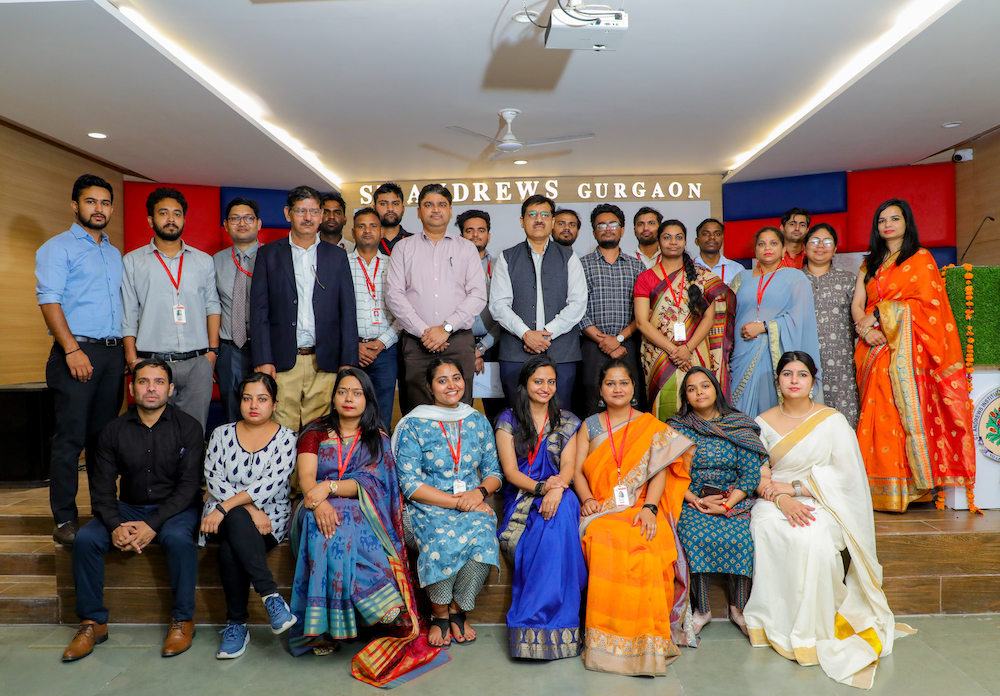
Image – 21 Management Faculty
This involves the responsibilities of an Employee Relations manager, which include managing workplace conflicts, ensuring a safe and positive work environment, and facilitating communication between staff and management. Human resources managers strive to resolve issues that emerge and mediate disputes to promote a collaborative work environment.
Compliance with Labor Laws
They ensure that the company adheres to all local, state, and federal employment laws. This includes managing risks and ensuring compliance with regulations regarding wages, hours, safety standards, and workplace discrimination.
Performance Management
Human resources teams develop criteria and systems to evaluate employee performance. This involves setting performance standards, conducting evaluations, and providing feedback to employees. It’s crucial for maintaining and improving job performance.
Strategic Management
Increasingly, human resources managers are expected to think strategically about how the workforce will grow and change over time. They help shape the organizational structure and planning, ensuring alignment with the overall strategic goals of the company.
Technology Integration
With digital transformation affecting all areas of business, human resources teams are also involved in integrating technology solutions that streamline HR processes, such as payroll systems, HR information systems (HRIS), and employee self-service portals.
Diversity and Inclusion
A crucial part of modern roles for those with an MBA in HR is to foster an inclusive work environment that respects diversity in all its forms. Human resources departments, often led by MBA in HR graduates, implement policies and practices that promote diversity and inclusion within the workplace.
FAQs
What does MBA HR do?
An MBA in Human Resources Management (HRM) equips professionals with the skills and knowledge to effectively manage the people-related aspects of organizations.
With an MBA in HR, they adeptly manage a spectrum of HR responsibilities, encompassing recruitment, training and development, compensation and benefits, employee relations, performance management, and organizational development.
Their role involves aligning HR strategies with business objectives, fostering a positive work culture, resolving conflicts, and ensuring compliance with labor laws and regulations.
Ultimately, MBA HR graduates contribute to creating an engaged, motivated, and high-performing workforce that drives organizational success.
Is MBA in HR a good option?
Whether pursuing an MBA in HR (Human Resources) is a good option depends on your career goals, interests, and the current job market. Here are some factors to consider:
High demand: Human resources managers are essential across all industries, driving demand for MBA HR graduates.
Versatility: Skills gained include leadership, conflict resolution, and strategic thinking, applicable across sectors.
Fulfilling work: Contributing to employee well-being and organizational success can be personally rewarding.
Networking: MBA courses offer opportunities to build connections with industry professionals.
Career growth: With experience, human resources managers can advance to executive positions, significantly enhancing their earning potential.
What is MBA HR program salary?
The salary for professionals with an MBA in HR can vary based on factors such as location, experience level, industry, and the size of the organization. However, here are some approximate average salary ranges for MBA HR graduates in India:
- Entry-level positions: ₹4-8 lakhs per annum
- Mid-level positions (3-5 years of experience): ₹8-15 lakhs per annum
- Senior-level positions (more than 5 years of experience): ₹15 lakhs and above per annum
These figures are indicative and can fluctuate based on individual qualifications, performance, and the specific job role and responsibilities. Additionally, salaries may differ between different regions in India and across industries.
Who is eligible for MBA HR course?
Eligibility criteria for MBA in HR courses can differ slightly depending on the institution, but generally include the following:
Bachelor’s degree: Candidates need a bachelor’s degree from a recognized university.
Minimum percentage: Typically, a minimum percentage (usually around 50%-60%) is required in the undergraduate degree.
Entrance exams: Many institutions require candidates to clear specific entrance exams like CAT, MAT, XAT, or CMAT.
Work experience (optional): While not mandatory, some programs prefer candidates with relevant work experience.
Interviews and group discussions: MBA admission candidates may be required to engage in interviews and group discussions as part of the admission process.
Language proficiency: Proficiency in English may be required, especially if the medium of instruction is English.
What are the subjects in MBA HR?
The subjects covered in an MBA in HR (Human Resources) program typically include a mix of core courses, specialized HR courses, and elective options.
Here are some typical subjects you might encounter in an MBA in HR curriculum:
Human Resource Management (HRM)
Fundamental concepts and theories of HRM, including strategic HR planning, staffing, performance management, and employee relations.
Organizational Behaviour
Study of individual and group behaviour within organizations, including topics such as motivation, leadership, communication, and organizational culture.
Talent Acquisition and Management
Recruitment strategies, selection processes, talent retention, succession planning, and workforce planning.
Training and Development
Designing and implementing training programs, employee development initiatives, performance appraisal systems, and career management.
Compensation and Benefits Management
Understanding compensation structures, salary surveys, incentive systems, employee benefits, and compensation strategy alignment with organizational goals.
Employee Relations and Labor Laws
Managing employee relations, handling grievances, disciplinary procedures, compliance with labor laws, and industrial relations.
Strategic HR Management
Aligning HR strategies with organizational goals, change management, HR analytics, and measuring HR effectiveness.
Organizational Development
Strategies for organizational change, culture transformation, organizational diagnosis, and interventions for improving organizational effectiveness.
Leadership and Team Management
Developing leadership skills, team dynamics, conflict resolution, and fostering collaboration and teamwork.
Ethics and Corporate Social Responsibility (CSR)
Ethical considerations in HR decision-making, corporate governance, and the role of HR in promoting CSR initiatives.
Is MBA HR easy to pass?
Success in an MBA in HR depends on individual aptitude, study habits, and the rigor of the program. While some may find it manageable with dedication and effective time management, others may struggle with the complexity of the subjects and their practical application.
HR management, a key component of an MBA in HR, requires a deep understanding of organizational dynamics, legal frameworks, and strategic HRM, which can be quite demanding.
Additionally, coursework, assignments, and exams require consistent effort. Overall, while it’s achievable with commitment and focus, passing an MBA in HR isn’t inherently easy and often requires dedication to succeed.
Is MBA HR easy or hard?
The difficulty of pursuing an MBA in HR can vary depending on individual factors such as prior knowledge, study habits, and the rigor of the specific program.
HR management encompasses a wide range of topics including organizational behaviour, talent management, and labor laws, which can be complex. Additionally, practical application of concepts in real-world scenarios adds depth to the learning process.
While some individuals might find an MBA in HR manageable with dedication and effective study strategies, others could find it challenging due to the broad range of subjects and the demand for critical thinking skills. Ultimately, whether an MBA in HR is perceived as easy or hard depends on the perspective and effort each person invests.
Does MBA HR have maths?
An MBA in HR primarily concentrates on managing people but also incorporates elements of quantitative analysis and statistics. This is particularly evident in specialized areas such as HR analytics, compensation management, and the financial dimensions of HR management.
Nonetheless, the mathematical complexity encountered in an MBA in HR program is generally less intense than that found in fields such as finance or operations.
Overall, MBA HR coursework tends to emphasize qualitative skills over mathematical proficiency.
What is the average salary of an HR Manager?
In India, the annual salary for an HR Manager who holds an MBA in HR generally varies between ₹600,000 and ₹1,500,000.
This range is influenced by several factors, including the manager’s level of experience, the size and location of the company, and the specific industry in which they are employed.
Generally, larger companies and metropolitan areas tend to offer higher salaries for HR managers compared to smaller firms and rural areas.
What is Business Administration?
Business Administration, which is a core component of an MBA course, involves managing and overseeing the operations of a business.
Business Administration encompasses a range of activities including planning, organizing, directing, and controlling the resources of an organization to achieve its goals. Key areas of focus include management, MBA finance, marketing, human resources, and operations.
The field of Business Administration, as explored in an MBA course, aims to ensure that businesses operate efficiently, meet their objectives, and remain competitive in their respective markets, leveraging the knowledge gained from the graduation degree.
What is MBA HR Syllabus and MBA HR Subjects.
An MBA in Human Resources (HR) typically covers subjects such as Organizational Behavior, HR Management, Employment Law, Compensation, Training & Development, Talent Management, Performance Management, Diversity & Inclusion, International HR, Change Management, HR Analytics, Ethics & CSR, Leadership Development, and Project Management. These topics encompass areas like recruitment, training, performance evaluation, legal compliance, and strategic HR planning.

